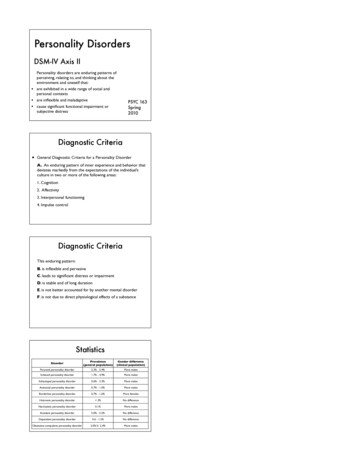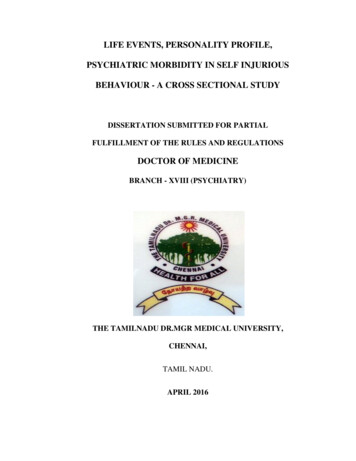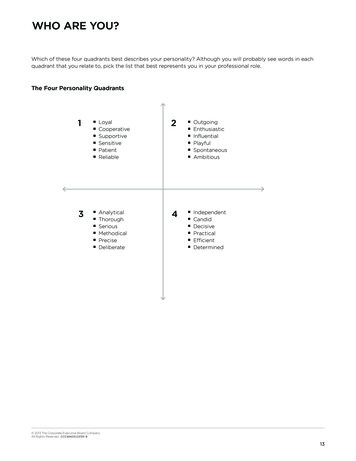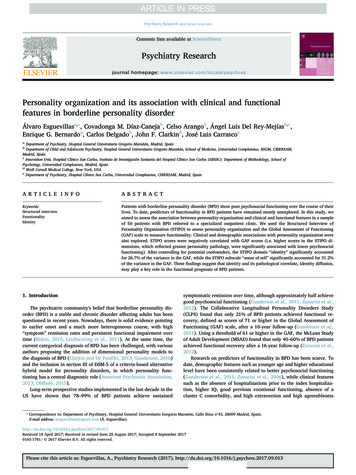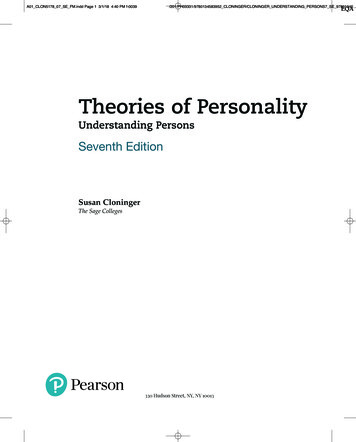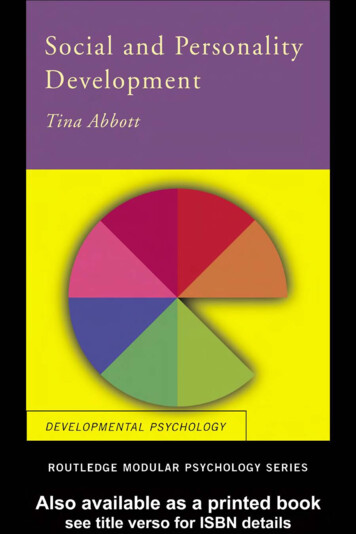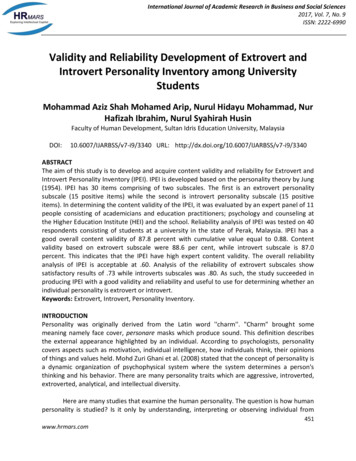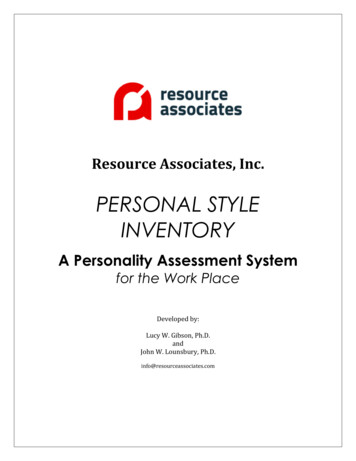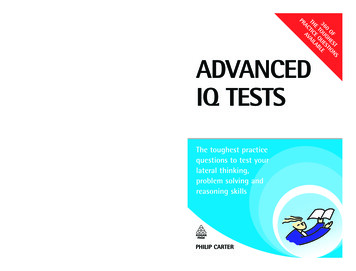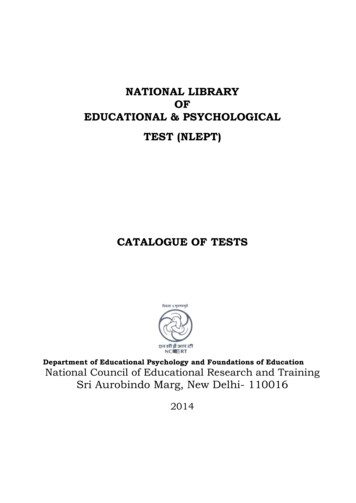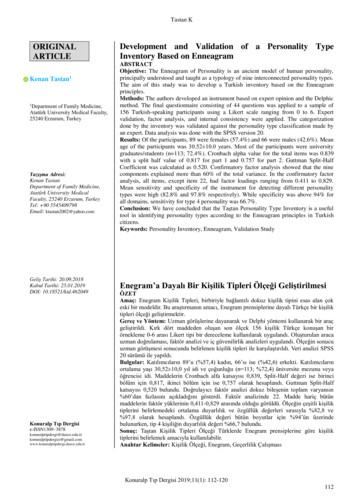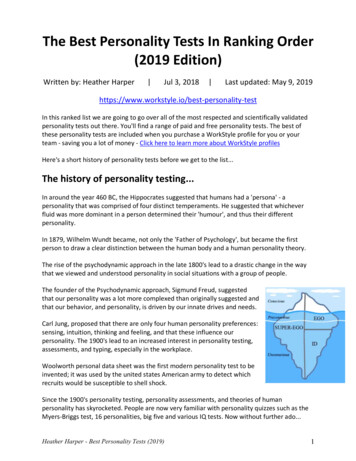
Transcription
The Best Personality Tests In Ranking Order(2019 Edition)Written by: Heather Harper Jul 3, 2018 Last updated: May 9, In this ranked list we are going to go over all of the most respected and scientifically validatedpersonality tests out there. You'll find a range of paid and free personality tests. The best ofthese personality tests are included when you purchase a WorkStyle profile for you or yourteam - saving you a lot of money - Click here to learn more about WorkStyle profilesHere's a short history of personality tests before we get to the list.The history of personality testing.In around the year 460 BC, the Hippocrates suggested that humans had a 'persona' - apersonality that was comprised of four distinct temperaments. He suggested that whicheverfluid was more dominant in a person determined their 'humour', and thus their differentpersonality.In 1879, Wilhelm Wundt became, not only the 'Father of Psychology', but became the firstperson to draw a clear distinction between the human body and a human personality theory.The rise of the psychodynamic approach in the late 1800's lead to a drastic change in the waythat we viewed and understood personality in social situations with a group of people.The founder of the Psychodynamic approach, Sigmund Freud, suggestedthat our personality was a lot more complexed than originally suggested andthat our behavior, and personality, is driven by our innate drives and needs.Carl Jung, proposed that there are only four human personality preferences:sensing, intuition, thinking and feeling, and that these influence ourpersonality. The 1900's lead to an increased interest in personality testing,assessments, and typing, especially in the workplace.Woolworth personal data sheet was the first modern personality test to beinvented; it was used by the united states American army to detect whichrecruits would be susceptible to shell shock.Since the 1900's personality testing, personality assessments, and theories of humanpersonality has skyrocketed. People are now very familiar with personality quizzes such as theMyers-Briggs test, 16 personalities, big five and various IQ tests. Now without further ado.Heather Harper - Best Personality Tests (2019)1
The Best Personality Tests In Ranking Order1. DiSCWebsite: DiscProfile.comIntroduced by Walter Clark in 1940, the DiSC personality profile was designed to measuredominance, influence, steadiness, and conscientiousness.The questionnaire was created predominantly for organizational use and can be used forleadership and executive development, management training, sales training, conflictmanagement, team building, customer services, communication and job coaching.The DiSC assessment contains 28 questions, where the participant picks a word that is most likethem, and a word that is least like them for each question. The DiSC assessment is designed tobe easy to use, easy to administer and to be delivered by anyone.Prices for this assessment range depending on the type of tests, the size and type of team it isbeing applied to and the number of people.For the most popular and applicable test, the ‘everything DiSC Workplace Profile', prices start at 64.50 each (per employee).For more information, visit the DiSC website. This test is also included in a WorkStyle profile.Heather Harper - Best Personality Tests (2019)2
2. 16 Personality Factor QuestionnaireWebsite: OpenPsychometrics.orgThe 16 Personality Factor Questionnaire (16PF) wasfirst published by Cattle, Tatsuoka, and Eber in 1949,however, since then there have been more additions.This questionnaire is based on Allports 4000 proposedpersonality traits, which Cattle Narrowed down to171, and then later down to 16, to design the tool.The questionnaire is designed to measure normalbehaviors and can be used for career development,employees selection, marital help, and counseling;but it does have some clinical reference.It measures: warmth, reasoning, emotional stability, dominance, liveliness, rule-consciousness,social boldness, sensitivity, vigilance, abstractedness, privateness, apprehension, openness tochange, self-reliance, perfectionism, tensionThe questionnaire is designed to be used by people 16 or older.It takes 30-35 minutes to complete by paper and pencil version, and 30 minutes to completeusing a computer/online version.3. HEXACO Model of Personality Structure Personality InventoryWebsite: Hexaco.orgThe HEXACO model was constructed in the year 2000 toassess some of the personality dimensions, and theoreticalinterpretations, that had been outlined in earlier studies.The model measures six major personality dimensions,namely: Honesty-Humility, emotionality, extraversion,agreeableness, conscientiousness, openness to experience.The inventory is comprised of 200 questions for the fulllength assessment or 100 questions for the half-lengthassessment.The HEXACO 60 is also available for when there is littletime. For more information on accessibility and pricing, visitthe HEXACO website.Heather Harper - Best Personality Tests (2019)3
4. Revised NEO Personality InventoryWebsite: Acer.edu.auDeveloped by Costa and McCrae in the 1970's and laterfinalized in 2005, the Revised NEO Personality Inventory(NEO-PI-R) was designed to measure and test the Big-5personality traits that are outlined in the five-factor model- namely: openness to experience, conscientiousness,extraversion, agreeableness, and neuroticism.The inventory also has six subcategories of each of the fivetraits, for instance, neuroticism is comprised of anxiety,hostility, depression, self-consciousness, impulsiveness,and vulnerability to stress.Whereas extraversion is comprised of the subcategoriesof warmth, gregariousness, assertiveness, activity,excitement seeking and positive emotion.The inventory was originally designed for adults but has shown to be useful for younger ages.The inventory can be used for counsellors, psychiatrists, psychologists, educators, and doctors,it has also been increasingly used in organizations over the years.The inventory consists of 240 items, which takes 30-40 minutes to complete.Pricing varies depending on what version you buy and how you administer it. For moreinformation on the product, how to administer it and how to buy it, visit this website.5. Myers-Briggs Type IndicatorWebsite: Myersbriggs.orgThe Myers-Briggs Type Indicator (MBTI) was introduced by Katharine Cook Briggs and herdaughter, Isabel Briggs Myers, in the 1940s.The test is based upon an earlier theory that was introduced by Carl Jung - a theory thathumans experience the world using four psychological functions: sensation, intuition, feelingand thinking.The MBTI measures whether an individual is extroverted or introverted, whether they have asensing preference or an intuitive preference when it comes to processing information,whether they prefer to make decisions by thinking or feeling and whether they have a judgingor perceiving preference about how they do things.Heather Harper - Best Personality Tests (2019)4
The results from the questionnaire then place the person onto one of 16 personalities, each hastheir own strengths and weaknesses, such as the ENJF personality type.The MBTI can be used for individualdevelopment, employee development,team development, team productivityand to increase team effectiveness.The questionnaire consists of 93 forcedchoice questions, where the participantmatches a word with a statement.The pricing of this tool will varydepending on what type of Myer-Briggstype indicator you buy and where youpurchase it from.For more information on the MBTI, visittheir website. This test is also includedwhen you purchase a WorkStyle profile.6. Eysenck Personality InventoryWebsite: Iluguru.eeThe Eysenck Personality Inventorymeasures personality on twoindependent dimensions:extroversion versus introversion andneuroticism versus stability.The questionnaire generates threescores, the 'E' score which indicateshow extroverted you are, an 'N' scorewhich measures how neurotic youare, and a 'lie' score, which measureshow much you have lied on thequestionnaire to be socially desirable.The full questionnaire consists of 100yes/no questions and takes 20-35minutes to complete.Heather Harper - Best Personality Tests (2019)5
There is also a shorted questionnaire that consists of 57 yes/no questions, that takes only 10-25minutes to complete.The pricing of the questionnaire varies depending on the scoring system you use and whether itis administered online.You can access the questionnaire and scoring options here.7. Eysenck Personality QuestionnaireWebsite: SimilarMinds.comNot to be confused with the Eysenck Personality Inventory, the Eysenck PersonalityQuestionnaire was later introduced by Hans Eysenck and Sybil Eysenck to measure personalityacross three dimensions of temperament: extroversion versus introversion, neuroticism versusstability and psychoticism versus socialization.The questionnaire consists of 100 “Yes/No” questions, or the short scale version consists of 48“Yes/No” questions.This questionnaire isn't a particularly well know personality test so versions, and information onthe questionnaire, are hard to find, however, there are some online versions available here.Heather Harper - Best Personality Tests (2019)6
8. Minnesota Multiphasic Personality InventoryWebsite: PearsonClinical.comIntroduced by Hathaway and McKinley in 1939, the Minnesota Multiphase PersonalityInventory (MMPI) can be used to assess adult personality and psychopathology across 10scales: hysteria, depression, paranoia, hypochondriasis, psychopathic deviate,masculinity/femininity, psychasthenia, schizophrenia, hypomania, and social introversion.The inventory does have a high clinical reference and isoften used to diagnose and assist treatment plans formental illnesses.However, it can also be used in occupational settings toscreen candidate - especially to measure the psychologicalstability of those in high-risk professions, such as the policeforce, pilots or the army.The MMPI has been changed and revised over the years, butthe most recent version, the MMPI-2, contains 567 truefalse questions and takes between a 60 to 90 minutes tocomplete.There is a shorter version, the MMPI-2-RF, which contains338 questions and takes around 30-50 minutes to complete.More detailed information can be found here.9. The Birkman MethodWebsite: Birkman.comIntroduced by Roger Birkman, the Birkman method is anonline assessment that measures personality, socialperception and occupational interests.The assessment is designed to provide insight into whatspecifically drives a person's behaviors in an occupationalsetting and social context.The questionnaire has 32 scales altogether, 10 that describeoccupational preferences, 11 that describe effectivebehaviors and 11 that describe interpersonal behaviours andenvironmental expectations.Heather Harper - Best Personality Tests (2019)7
The method can be used to assess personality in any setting, and is often used in organisationalsettings for leadership development, team building, career exploration, talent selection and toenhance sales and negotiation.The assessment consists of 298 questions, 250 of which are true-false questions and 48 ofwhich are multiple-choice. This personality assessment takes around 30 minutes to completeonline. Pricing not directly available, visit their website for more information.10. Values and Motives InventoryWebsite: PsyTech.comThe Values and Motives Inventory is designed to identify what drives and energises a personand where they are most likely to gain satisfaction from work.The inventory measures interpersonal, intrinsic and extrinsic values as well as summarisingpossible motivating and demotivating factors to an individual at work.The inventory takes around 20-minutes to complete and can be used for personal growth,development and team building , but it is not recommended for selection.It can also be used for counselling, coaching and vocational guidance. Pricing is not availableonline, but you can view a sample report here.11. Motives, Values, Preferences Inventory (MVPI)Website: HoganAssessments.comIntroduced by Hogan and Hogan, the Motive, Values and Preferences Inventory (MPVI)evaluates a person’s core goals, values, drivers and interests that determine what they strive toattain.Heather Harper - Best Personality Tests (2019)8
The results from this inventory can, in return, predict job success and satisfaction.The MPVI assesses personality on 10 scales: Recognition, Power, Hedonism, Altruism,Affiliation, Tradition, Security, Commerce, Aesthetics and Science.The MPVI isn't designed to be invasive or intrusive, making it excellent for organisational use.The MPVI can be used for leadership, to identify a person’s fit to the organisational culture andto help create long-term strategies for career development.The inventory takes 15 to 20 minutes to complete and can be administered online, or becompleted by pen and paper. Pricing is not available online, but it is most likely expensive.For more information, visit their website.12. Hogan Personality InventoryWebsite: HoganAssessments.comAlso introduced by Hogan and Hogan in the 1980's, the Hogan Personality Inventory (HPI) isbased on the five-factor model and the socio-analytic theory.The HPI measures personality across key behavioural tendencies: adjustment, ambition,sociability, interpersonal sensitivity, prudence, inquisitiveness and learning approach.It also has six occupational scale which measure: service orientation, stress tolerance, reliability,clerical potential and sales potential.Designed to not be invasive or intrusive and to have a focus towardsoccupational interest and use, the HPI is handy to businesses and can be usedfor staff selection, personal development, staff retention and leadership.The HPI contains 206 questions and takes 15 to 20 minutes to complete.Pricing is not directly available, but more information on how to access andadminister the inventory can be found here.Heather Harper - Best Personality Tests (2019)9
13. Hogan Development SurveyWebsite: HoganAssessments.comThis psychometric measure was also introduced by Hogan and Hogan in 1994.The survey is designed to measure dark personality in an occupational setting across 11 traits:excitable, skeptical, cautious, reserved, leisurely, bold, mischievous, colourful, imaginative,diligent and dutiful.The traits measured are all qualities believed to emergein employees at times of strain and are traits that candisrupt employee relationships, damage the companies’reputation and derail peoples chances of success.The questionnaire is designed to have no clinicalreference or to diagnose any mental illnesses and istherefore incredibly valuable to organisations.The HDS can be used to aid employee careerdevelopment, recognise employee weaknesses andmitigate there before it affects their performance.Limited information on the length of the assessment andthe pricing is available online, but for more detail visitthe Hogan website.14. California Psychological Inventory (CPI)Website: Psychometrics.comIntroduced by Harrison Gough in 1956, the Californian Psychological Inventory is designed todescribe 'everyday behaviour' across 18-scales.The inventory can be used for employee selection, individual development,succession planning, employee selection, employee retention, executive coachingand can outline performance improvements and motivation of individuals.The questionnaire can be used by anyone over the age of 13. The inventory can beadminister online, or by pen and paper and contains 434 true-false questions,taking around 45-60 minutes to complete.There are lots of different options on types of ways to use the CalifornianPsychological Inventory , all with varying prices - for more information, visit here.Heather Harper - Best Personality Tests (2019)10
15. Personality Assessment Inventory (PAI)Website: SigmaAssessmentSystems.comThe Personality Assessment Inventory was introduced by Leslie Morey in 1991 to assesspersonality and psychopathology across four scales:(1) clinical scales, which measures neurotic, psychotic and problematic behavioural tendencies;(2) treatment consideration scales, which measures aggression, suicidal ideation, nonsupport,stress and treatment rejection; (3) interpersonal scales, which provides an assessment ofwhether someone is warmly affiliative versus coldly rejecting, or dominant versus submissive;and (4) validity scales, which are there to ensure the test is valid.The inventory consists of 344 items that are measured on a fourpoint scale from 'not true at all' 'slightly true' 'mainly true' 'false'.The inventory takes an hour or less to complete and can becompleted online for 799, or by pen and paper for 399 - it is notclear online how many tests this gives you for this price, but formore information look here.16. Personality and Preference Inventory (PAPI)Website: MeritSolutions.comDesigned by Max Kostick in the early 1960's, the Personality and Preference Inventory isdesigned to comprehensively cover aspects of personality that are relevant to the workplaceand is designed to elicit behaviours and preferences that are appropriate to vacant positions inthe workplace.The inventory has ten 'role scales', which measures our perception of our behaviour in a worksituation; and ten 'needs scales', which measure an individual’s preference for behaving in aparticular way.The inventory is designed to be simple to administer, to avoid clinicalterminology and interpretation and to be used by non-psychologists,making it great for personal use, or for organisational use.The inventory consists of 180 items and take approximately 15minutes to complete.There is no pricing or direct link to the inventory online, but moreinformation is available here about the Personality and PreferenceInventory.Heather Harper - Best Personality Tests (2019)11
17. Keirsey Temperament SorterWebsite: Keirsey.comDavid Keirsey expanded on the temperament theory that was originally introduced byHippocrates (outlined in the introduction to this blog).The questionnaire measures personality across four temperaments: artisan, guardian, idealistand rational.Keirsey then divided these four temperaments introtwo categories (roles), each with two types (rolevariants) - these 16 personality types correlate withthe 16 personality types that are outlined in theMyers-Briggs Personality Type inventory.The test is very popular in the US and have even beenused by the Bank of America and the US air force.There is little information on the nature, length orpricing of the questionnaire online.18. True ColoursWebsite: My-personality-testIntroduced by Don Lowry in 1978, the TrueColours test was designed to measure four basiclearning styles: independent thinkers, pragmaticplanners, action-oriented, people-oriented.Each of the learning styles represents a colour(hence the name), and each person can be aunique blend of all of four colours.The results from this assessment can be used tohelp mitigate potential conflict betweenindividuals by understanding each other’scharacteristics.Little information is available online but a quickTrue Colours Test can be taken for free to get arough idea of what your true colours may be.Heather Harper - Best Personality Tests (2019)12
19. Caliper ProfileWebsite: Caliper.com.auThe Caliper profile is an employee and applicant assessment instrument that measures anindividuals job performance potential and can find out which person is best suited for the jobbased on their intrinsic motivation.The results from these profiles are often used forhiring, employee development, teamimprovement, talent alignment, successionplanning, employee engagement and to increaseproductivity.The Caliper Profile consists of 180 multiple choicequestions and can sometimes take as long as 2hours to complete.20. Rorschach Inkblot TestWebsite: TheInkBlot.comInvented by Hermann Rorschach in the 1960s, the inkblot test is perhaps one of the mostunique and 'quirky' personality tests out there.Typically done in person, the inkblot test is an assessment where an examiner presents theparticipant with an inkblot, and the participant tells the examiner what they see.The participant perception of the inkblot isthen analysed and interpreted by apsychologist using complex algorithms - this isthen says things about the participantspersonality.The test is designed to deter the psychologicalstate of an individual and can be used onchildren from the age of 5, all the way toadults.Traditionally the test is done in person with anexaminer, but you can do a free shortenedtest online.Heather Harper - Best Personality Tests (2019)13
21. Szondi TestWebsite: Learning-Mind.comDeveloped by Leopold Szondi in 1935, the Szondi test is based on the systematic drive theoryand the dimensional model of personality.During the test, participants are shown a series of facial photographs which represent peoplewho have been classified as homosexual, sadist, epileptic, hysteric, catatonic, paranoid,depressive and a maniac.The participants then pick the most appealing and most repulsive pictures, and it is believe thatthe one deemed most 'repulsive' displays something about our personality as we have formedan aversion, or become repressed to that psychological state.This traditional test is not really used that much anymore, but you can still complete some freeversions online such as this one.Heather Harper - Best Personality Tests (2019)14
Frequently asked questions:Can I use these tests in the workplace?Yes.In recent years there has been an increase in the use of personality testing in the workplace andthere is a growing amount of research to support its use.Studies have found that employees who fit well in an organization are more satisfied and morelikely to stay within the organization - and what’s the most effective way to ensure anemployee fits into an organization?You got it, personality testing!Richard Branson also once quoted that 'company knowledge and job-specific skills can belearned, but you can't train a personality', so in order to get the most effective employees foryour team you could incorporate personality testing at some point.For personality tools, specifically designed to measure personality in the workplace, check outthis post I wrote a few months ago.However, there are dangers of using personality testing in the workplace, especially for hiring.For more insight into the potential problems of using personality testing in the workplace, givethis article a read.These seem old, are there modern day alternatives?Granted, some of these tests are fairly old and perhaps slightly outdated, such as the inkblottesting.However, the tests such as the Myers Briggs Type Indicator, DiSC and the assessmentsintroduced by Hogan and Hogan are pretty modern and have been shown to have goodreliability and validity in recent years.However, if you really do want to take a step into the modern day and explore newalternatives, there has been an increase in online tools that combine many personality tests in afun and insightful way.Many of these tests are aimed at organizations, but some could be used for personal use.Heather Harper - Best Personality Tests (2019)15
Can I use these on my children to predict their success at school?There are studies to suggest that a child's personality will predict school success.For example, studies have suggested that children who are highly conscientious will be moresuccessful in school due to their ability to be organized, meet deadlines, comply with rules andwork hard.There is also research to suggest that the personality traits we display can influence our careerchoice and success.However, as with almost all things in psychology, there is a huge debate as to whether anythinghumans do is due to nature or nurture - even our personality, is it influenced by ourenvironment or our genetics?So, it is possible, that when wondering about your child's school and future life success, theirpersonality will not be the only influencing factor, their success can be greatly influenced byhow you, their parent, raise them.Will knowing the results of my personality tests benefit me in life?Yes, in many ways knowing and understanding your personality can benefit you in life.Firstly, understanding your personality will help you at work as it can help you decide whatcareer path to choose, how to develop this career and what sort jobs to apply for based on yourpersonality (and how to behave in these interviews).Understanding your own, unique, personality will also aid you in personal development - youcan understand how you best interact with others, how you need to relax, what motivates youand how you handle stress or pressure.You are the only person in the world with your personality; you should really invest in learningto understand it.However, it is important to remember that personality testing does force people into categoriesor scales; so, although understanding your personality in psychological terminology is great, dobe mindful that it may not always be completely accurate.What do I do if I don't get the result I wanted?Then you are not who you want to be, and there's nothing wrong with that either.Learn to understand your own strengths and weakness and learn how you can use these toyour advantage.Heather Harper - Best Personality Tests (2019)16
Say, if you so desperately wanted to be an extrovert so you could be 'popular' or accepted byothers, but it turns out that you're actually massively introverted, then you must learn tounderstand what your needs and wants actually are to be satisfied.You will most likely not want to be surrounded by people, you will prefer solo work and you willprefer to unwind by being alone - and there's nothing wrong with that either, both extrovertsand introverts can be popular, successful and satisfied.The Best Personality Tests In Ranking Order (2019 Edition) - Heather stHeather Harper - Best Personality Tests (2019)17
5. Myers-Briggs Type Indicator Website: Myersbriggs.org The Myers-Briggs Type Indicator (MBTI) was introduced by Katharine Cook Briggs and her daughter, Isabel Briggs Myers, in the 1940s. The test is based upon an earlie

